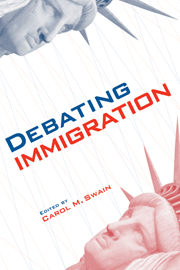Book contents
- Frontmatter
- Contents
- About the Contributors
- Preface
- Acknowledgments
- 1 Introduction
- PART I PHILOSOPHY AND RELIGION
- PART II LAW AND POLICY
- 6 The Undocumented Immigrant
- 7 Good Neighbors and Good Citizens
- 8 Alien Rights, Citizen Rights, and the Politics of Restriction
- PART III ECONOMICS AND DEMOGRAPHICS
- PART IV RACE
- PART V COSMOPOLITANISM
- PART VI CONCLUSION
- Notes
- Index
7 - Good Neighbors and Good Citizens
Beyond the Legal–Illegal Immigration Debate
Published online by Cambridge University Press: 05 June 2012
- Frontmatter
- Contents
- About the Contributors
- Preface
- Acknowledgments
- 1 Introduction
- PART I PHILOSOPHY AND RELIGION
- PART II LAW AND POLICY
- 6 The Undocumented Immigrant
- 7 Good Neighbors and Good Citizens
- 8 Alien Rights, Citizen Rights, and the Politics of Restriction
- PART III ECONOMICS AND DEMOGRAPHICS
- PART IV RACE
- PART V COSMOPOLITANISM
- PART VI CONCLUSION
- Notes
- Index
Summary
The year 2006 will go down in history as the year when immigration moved definitively to the center stage of American national politics. For more than 20 years, political elites have been able to contain and marginalize this intractable and emotional issue, dealing with it discreetly and episodically. But over time, the number of newcomers – both legal and illegal – has continued to grow and is now reaching historic proportions. Meanwhile, the dispersion throughout the United States of immigrants formerly concentrated in a few gateway states has contributed to the nationalization of this issue.
The politics of immigration changed fundamentally in 2001, when the George W. Bush administration seized on the issue in order to build support among Hispanics and to open a dialogue with Mexico's president, Vicente Fox, one of the few heads of state eager to do business with the new president. This was the rare occasion when a major national political figure did not merely react to events or seek the protective cover of a study commission but grabbed immigration with both hands to further his own objectives. Sidelined by the terrorist attacks of September 11, 2001, Bush's immigration initiative reemerged in January 2004 with his proposed guestworker program. That proposal jump-started a debate over illegal immigration that was then fueled by tough enforcement legislation passed by the House of Representatives in December 2005.
- Type
- Chapter
- Information
- Debating Immigration , pp. 95 - 113Publisher: Cambridge University PressPrint publication year: 2007
- 3
- Cited by



